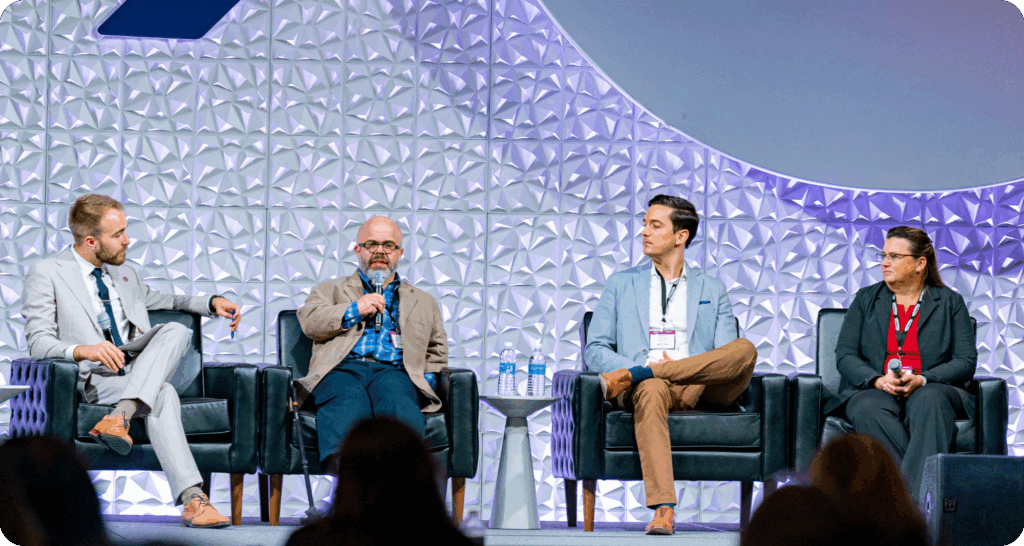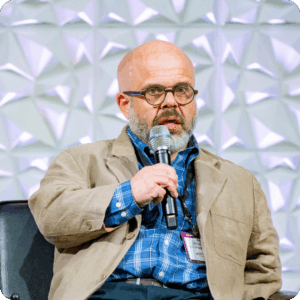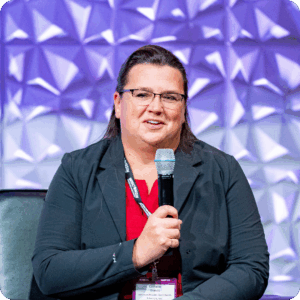
The exporting panel at the 2025 Wisconsin Economic Summit
In a recent conference panel, three Wisconsin exporters said the uncertainty created by recent rounds of global tariffs is complicating their efforts to expand. Speaking at the 2025 Wisconsin Economic Summit, held in Green Bay in mid-October, representatives of the three companies shared challenges encountered and lessons learned in selling their products—ranging from ginseng and lip balm to fitness equipment—into overseas markets.
Planning for an uncertain future

Jonathan Dudzinski of Bee Bella
Jonathan Dudzinski, co-founder of Bee Bella—an organic lip balm company based in Oshkosh—described the difficulty his company faced in finding the bamboo tubes they used for their lip balm from a source not based in China. “We tried to find suppliers outside of China. We worked with one who said they could do it,” he said. But the tubes ordered through that supplier wound up containing bamboo sourced in China, anyway—and were therefore subject to the same tariffs.
Dudzinski said these complications led the company, which has seven employees, not to launch a second product or add new employees or equipment. “The impact for us has been very real and dramatic,” he said.
Mike Klemp-North, vice president of facilities and administration at Hsu’s Ginseng Enterprises, based in Wausau, said 85-90% of the ginseng grown in Wisconsin ultimately lands in the hands of people in China. He said the additional cost and uncertainty of frequently changing tariffs have made the market volatile, complicating planning and forecasting efforts.
Producing ginseng is a seven-year commitment, Klemp-North said. “We can’t stop on a dime. We can’t change things quickly. That’s the dilemma that we’re facing right now … If this continues, we will lose that industry.”

Mike Klemp-North of Hsu’s Ginseng Enterprises
Christie Draves, vice president of accounting and finance at Cottage Grove-based Johnson Health Tech North America, shared how the company had been affected. Last year, its parent company in Taiwan—one of the fastest-growing commercial fitness equipment manufacturers in the world—chose to build its new factory in Vietnam rather than the U.S., she said.
Draves said messages about bringing manufacturing back to the U.S. often oversimplify the factors involved in making that possible. “You can’t bring manufacturing here by flipping a switch,” she said. “It takes years to build a factory. It takes years to source the products that are needed.”
Envisioning growth amid challenges
Draves said Johnson Health Tech continues to grow its Wisconsin operations, even in this uncertain economy. The Cottage Grove facility currently houses nearly 500 of the company’s 1,200 employees nationwide and is looking at options to expand. The reason, she says, is primarily “our people. It’s our strong base of the high level of intelligence and the skill set that we have right here in Wisconsin.”

Christie Draves of Johnson Health Tech North America
She suggested forming more partnerships with schools and developing more internships as a way to grow the state’s workforce. Klemp-North said foreign language skills and the ability to understand other cultures also “is crucial for survival.”
In spite of the current tariff concerns, panel members agreed that exporting remains an important avenue for Wisconsin manufacturers.
“Longer-term, we still see a tremendous amount of value in exporting. Most of the consumers in the world are not here in the United States,” said Dudzinski, who participated in a recent WEDC Global Trade Mission to Japan and said it was fascinating to see how business is conducted differently in other parts of the world.
“I’ve loved going on these trips and meeting with our customers overseas,” he said.
WEDC Market Development Director Rome Rauter, who facilitated the panel discussion, sees continuing promise for Wisconsin exporters. “I’m constantly reminded of what we have to offer and how interested the world is in being part of it,” he said.
